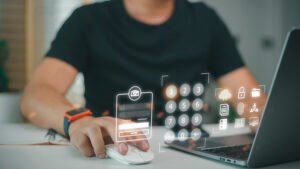If someone gains access to your bank account and routing numbers, they can use the information to fraudulently withdraw or transfer money from your account. They can also create fake checks, claim your tax return or commit other forms of financial fraud.
Your bank account number distinguishes your specific account from the other accounts held by your financial institution. Similarly, your routing number identifies the bank or credit union where the account resides. Together, these numbers are essential for making direct deposits, bill payments, automatic transfers and more.
But if these numbers get into the wrong hands, you could fall victim to severe financial fraud. If someone has your bank account and routing number, they could make unauthorized ACH transfers and payments, create counterfeit checks and even launder money through your account.
![]()
What Can Someone Do With Your Bank Account and Routing Number?
If someone has your bank account number, but not your routing number, the financial harm they can inflict is somewhat limited. For instance, it would be difficult to withdraw money from your account or create new checks without being able to identify which bank your account is at. But if someone has both your bank account and routing number, they can commit a wide range of fraudulent activities that could harm you financially, such as:
Fraudulent payments, withdrawals and transfers: You’ve seen ACH transfers on your bank statement and may know they stand for the Automated Clearing House network that roughly 10,000 financial institutions use to process transactions domestically. Someone with ill intentions could use your bank account and routing numbers to make unauthorized payments, withdrawals and electronic funds transfers. Check your bank transactions regularly to spot any irregular activity and act on it before problems mount.
Unauthorized purchases online:
Scammers and criminals can run up charges quickly by using your bank account and routing number to make online purchases. Some online retailers make it even easier for criminals to fraudulently use your account by only requiring a bank account number to make purchases.
Real-Life Consequences and Legal Cases Involving CPN Misuse
- Counterfeit checks: Someone can also use your bank account and routing numbers to create fake checks. They can then cash those checks or use them to pay for goods and services. Scammers can deposit funds into their own account either digitally using a smartphone or physically at a bank or ATM.

- Money laundering through your account: Contact your bank immediately if you notice an account deposit you don’t recognize. Someone may be using your account to launder money obtained illegally.
- Identity theft: Criminals can use your banking information and any other personal data they collect to steal your identity. These schemes are often employed to open new credit cards, receive your tax returns and commit other unpleasant forms of fraud.
Related Posts
What Can Someone Do With Your Bank Account and Routing Numbers?
If someone gains access to your bank account and routing numbers, they can...


